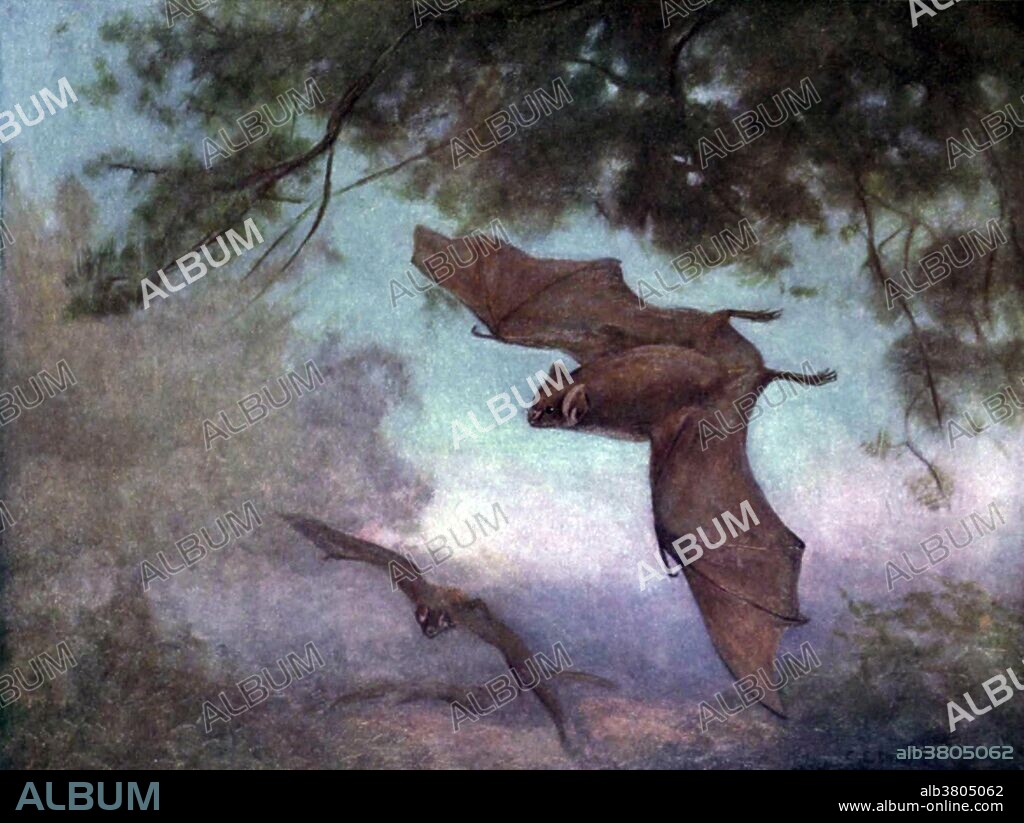alb3805062
Vampire Bats, 1909

|
Add to another lightbox |
|
Add to another lightbox |



Buy this image.
Select the use:

Title:
Vampire Bats, 1909
Caption:
Vampire bats are bats whose food source is blood, a dietary trait called hematophagy. Three bat species feed solely on blood: the common vampire bat (Desmodus rotundus), the hairy-legged vampire bat (Diphylla ecaudata), and the white-winged vampire bat (Diaemus youngi). A vampire bat has front teeth that are specialized for cutting and the back teeth are much smaller than in other bats. The inferior colliculus, the part of the bat's brain that processes sound, is well adapted to detecting the regular breathing sounds of sleeping animals that serve as its main food source. While other bats have almost lost the ability to maneuver on land, vampire bats can walk, jump, and even run by using a unique, bounding gait, in which the forelimbs instead of the hindlimbs are recruited for force production, as the wings are much more powerful than the legs. Vampire bats use infrared radiation to locate blood hotspots on their prey. Drawing by Cuthbert E. Swan appeared in "The wild beasts of the world by Frank Finn", 1909.
Category:
ILLUSTRATION • Historical & Fine Arts • Animals
Credit:
Album / Science Source / British Library
Releases:
Image size:
4350 x 3269 px | 40.7 MB
Print size:
36.8 x 27.7 cm | 14.5 x 10.9 in (300 dpi)
Keywords:
1900S • 1909 • 1990S • 20 20TH XX XXTH TWENTIETH CENTURY • 20 XX TWENTIETH CENTURY • 20TH CENTURY • 20TH • 90S • ANIMALS • ART • ARTWORK • CHIROPTERA • CHORDATA • CHORDATE • COMMON VAMPIRE BAT • DESMODONTINAE • DESMODUS ROTUNDUS • DRAWING • FLYING • HAEMOPHAGY • HALLOWEEN • HEMOPHAGOUS • HEMOPHAGY • HISTORIC • HISTORICAL & FINE ARTS • HISTORICAL • HISTORY • ILLUSTRATION • ILLUSTRATIONS • ILUSTRATION • MAMMAL • MAMMALIA • MAMMALIAN • MAMMALS • NEW WORLD BAT • NEW WORLD LEAF-NOSED BATS • NINETIES • NINETIES, THE • NINETY DECADE • PHYLLOSTOMIDAE • TWENTIETH CENTURY • VAMPIRE BAT
 Pinterest
Pinterest Twitter
Twitter Facebook
Facebook Copy link
Copy link Email
Email
